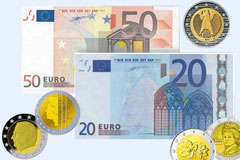EU – Baltic States, Financial Services, Latvia, Lithuania
International Internet Magazine. Baltic States news & analytics
Friday, 13.02.2026, 18:34
Lithuanian PM keen on fast-track euro idea, but Latvia is against
 Print version
Print version |
|---|
The Financial Times on Monday quoted what it said was a confidential IMF report as saying the euro zone could relax entry rules so struggling eastern EU states could join as quasi-members without getting a seat on the European Central Bank's Governing Council.
The ECB and European Commission have rejected such the idea, but Lithuanian Prime Minister Andrius Kubilius said he liked it.
"I think the proposal on partial euro adoption is a very serious one for the European Union," Kubilius told ELTA journalists. "I would support it if it was to be put for debate at the European Council."
Lithuania would also agree to forego a seat at the European Central bank, but was against a unilateral euro adoption.
"If the condition for speedier euro adoption would be not to have a seat (at the ECB), then yes, (we agree)," said Ridas Jasiulionis, the spokesman for the prime minister.
He said Lithuania would then not seek a seat at the ECB until it met all the euro adoption criteria.
"Lithuania will continue to strive to meet all (Maastricht) requirements, but this decision (on speedier euro adoption) would benefit Lithuania in the current crisis," he added.
Kubilius also said that early euro adoption would give the country access to credit sources and drive down interest rates.
Lithuania's central bank governor was more cautious.
"Of course, it would be easier for us to adopt the euro sooner, but I don't want anyone to say later we got into the euro zone due to exceptions being made," Reinoldijus Sarkinas told Reuters.
Lithuania, and fellow Baltic states Latvia and Estonia, have their currencies pegged to the euro and have pledged to keep them that way, despite frequent rumours of devaluations.








 «The Baltic Course» Is Sold and Stays in Business!
«The Baltic Course» Is Sold and Stays in Business!

